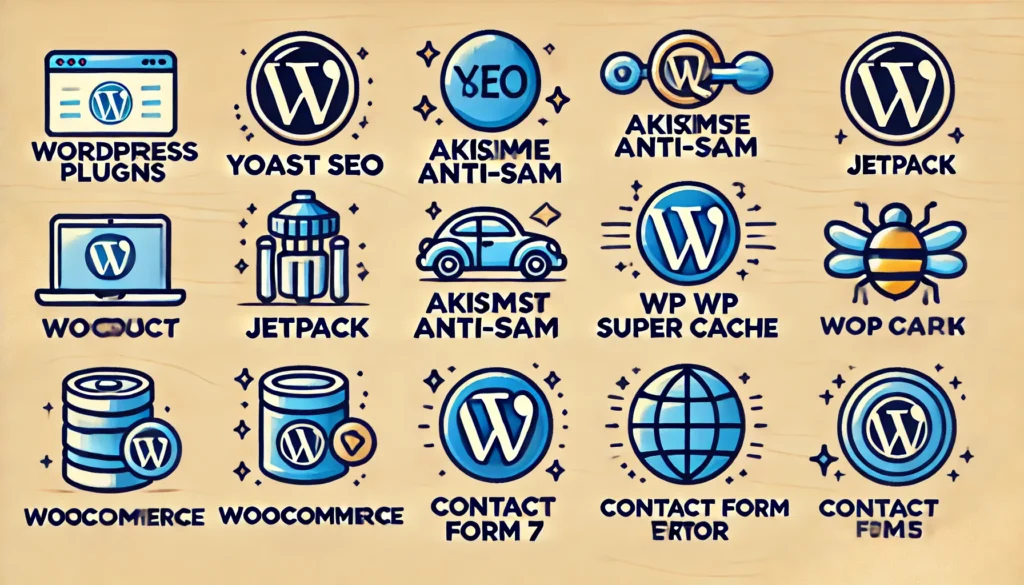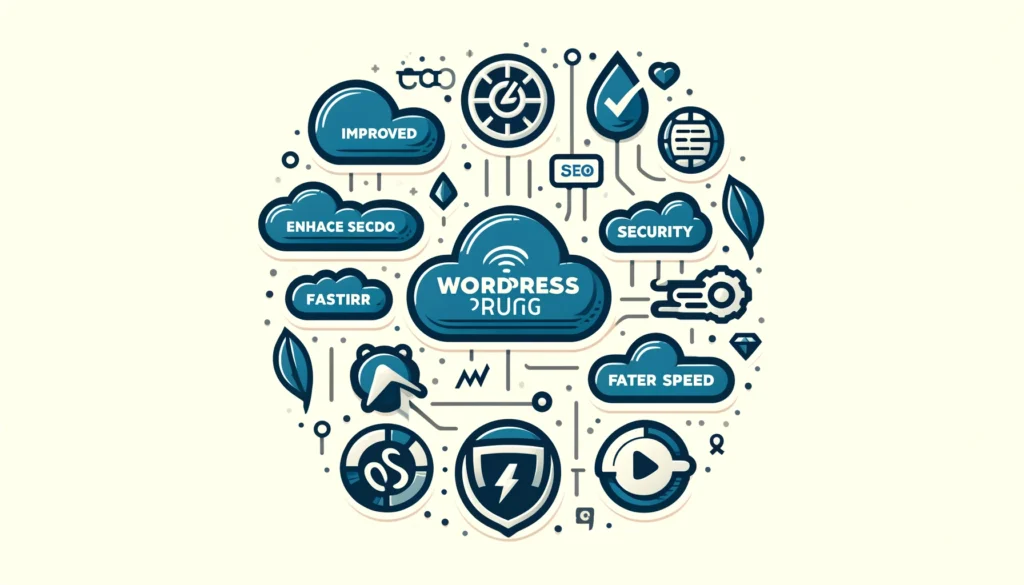Introduction
Hello! I’m Imran, and from my career experience in web development, I’ve learned the immense value of using the right plugins to enhance a WordPress site. Plugins can add powerful features and improve functionality, making your site more efficient and user-friendly. In this post, I’ll share a list of must-have plugins for WordPress, how each plugin improves site functionality, and tips for choosing and installing plugins.
Must-Have Plugins for WordPress
1. Yoast SEO
Yoast SEO is one of the most popular SEO plugins available. It helps you optimize your website for search engines, ensuring your content ranks higher and attracts more visitors.
Features:
- Keyword optimization
- Readability check
- Meta tags and descriptions
- XML sitemaps
- Breadcrumbs navigation
How it improves functionality: Yoast SEO helps you improve your website’s visibility in search engines, which can lead to increased traffic and better user engagement.
2. Akismet Anti-Spam
Akismet Anti-Spam is a powerful plugin that automatically filters out spam comments on your blog posts.
Features:
- Automatic spam filtering
- Comment status history
- Discard feature to block worst spam
How it improves functionality: By reducing spam, Akismet ensures that your comment section stays clean and relevant, improving the overall user experience.
3. Jetpack
Jetpack is an all-in-one plugin that offers a range of features to enhance your website’s performance, security, and user engagement.
Features:
- Site analytics
- Automatic social media sharing
- Security features like malware scanning
- Site performance optimization
- Customizable themes
How it improves functionality: Jetpack provides multiple tools in one plugin, making it easier to manage your site’s performance, security, and content distribution.
4. WooCommerce
If you’re running an e-commerce site, WooCommerce is a must-have plugin. It transforms your WordPress site into a fully functional online store.
Features:
- Product listings
- Shopping cart and checkout
- Payment gateway integration
- Inventory management
- Shipping options
How it improves functionality: WooCommerce provides all the tools you need to manage an online store, making it easy to sell products and manage transactions.
5. WP Super Cache
WP Super Cache is a plugin designed to improve your site’s speed by generating static HTML files from your dynamic WordPress site.
Features:
- Page caching
- CDN support
- Scheduler to clear cached pages
- Cache preload
How it improves functionality: By caching pages, WP Super Cache reduces the load on your server and speeds up page load times, enhancing user experience and SEO performance.
6. Contact Form 7
Contact Form 7 allows you to create and manage multiple contact forms on your site. It’s flexible and easy to use.
Features:
- Simple form creation
- Customizable form fields
- Spam filtering with Akismet
- AJAX submission
How it improves functionality: Contact Form 7 makes it easy for visitors to get in touch with you, which can help increase engagement and generate leads.
7. UpdraftPlus
UpdraftPlus is a comprehensive backup plugin that helps you back up your site’s data and restore it easily if something goes wrong.
Features:
- Automatic backups
- Cloud storage support (Google Drive, Dropbox, etc.)
- Easy restoration
- Scheduled backups
How it improves functionality: Regular backups ensure that you can quickly recover your site if it gets hacked or if you encounter any technical issues.

8. Elementor
Elementor is a powerful page builder plugin that allows you to design custom pages using a drag-and-drop interface.
Features:
- Drag-and-drop editor
- Pre-designed templates
- Responsive design
- Custom CSS
- Widgets and integrations
How it improves functionality: Elementor gives you full control over your site’s design without needing to write code, making it easy to create visually appealing and functional pages.
9. MonsterInsights
MonsterInsights is a Google Analytics plugin that helps you track and analyze your site’s traffic directly from your WordPress dashboard.
Features:
- Google Analytics integration
- Real-time stats
- E-commerce tracking
- Custom reports
- Event tracking
How it improves functionality: By providing detailed insights into your site’s traffic and user behavior, MonsterInsights helps you make data-driven decisions to improve your site’s performance.
10. WPForms
WPForms is a user-friendly form builder plugin that allows you to create contact forms, surveys, payment forms, and more.
Features:
- Drag-and-drop form builder
- Pre-built templates
- Spam protection
- Payment integration
- Conditional logic
How it improves functionality: WPForms makes it easy to create any type of form, helping you collect valuable information from your visitors and improve user engagement.
11. Smush
Smush is an image optimization plugin that compresses and optimizes images without losing quality.
Features:
- Image compression
- Bulk optimization
- Lazy loading
- Automatic resizing
- Directory smush
How it improves functionality: By optimizing images, Smush helps improve your site’s load time, which enhances user experience and boosts SEO performance.
12. Redirection
Redirection is a powerful plugin for managing 301 redirects and keeping track of 404 errors on your site.
Features:
- Easy redirect management
- 404 error monitoring
- Conditional redirects
- Log and track all redirects
How it improves functionality: Redirection helps you manage broken links and redirects, ensuring that users and search engines can always find the right content on your site.
13. Sucuri Security
Sucuri Security is a comprehensive security plugin that protects your site from malware, hacks, and other security threats.
Features:
- Security activity auditing
- File integrity monitoring
- Remote malware scanning
- Blacklist monitoring
- Security hardening
How it improves functionality: Sucuri Security provides multiple layers of protection, helping keep your site safe from security threats.
14. Google XML Sitemaps
Google XML Sitemaps is a plugin that automatically generates an XML sitemap for your site, making it easier for search engines to index your content.
Features:
- Automatic XML sitemap generation
- Support for all post types and custom taxonomies
- Notify search engines of updates
How it improves functionality: An XML sitemap helps search engines crawl and index your site more effectively, improving your SEO performance.
15. Broken Link Checker
Broken Link Checker is a handy plugin that monitors your site for broken links and missing images.
Features:
- Detects broken links and missing images
- Notifies you via email or dashboard
- Prevents search engines from following broken links
How it improves functionality: By keeping your site free of broken links, Broken Link Checker helps maintain a good user experience and avoids negative impacts on your SEO.
Tips for Choosing and Installing Plugins
1. Check Plugin Reviews and Ratings
Before installing a plugin, check its reviews and ratings. Look for plugins with high ratings and positive reviews from other users.
2. Ensure Compatibility
Make sure the plugin is compatible with your version of WordPress and any other plugins you’re using. Check the plugin’s description for compatibility information.
3. Look for Regular Updates
Choose plugins that are regularly updated by their developers. Regular updates ensure that the plugin is secure and compatible with the latest version of WordPress.
4. Consider the Plugin’s Support
Check if the plugin offers good support. Look for plugins with active support forums or a dedicated support team that can help you with any issues.
5. Test the Plugin
Before installing a plugin on your live site, test it on a staging site or a local development environment. This helps you identify any potential issues without affecting your live site.
6. Keep Plugins Updated
Regularly update your plugins to ensure they’re secure and functioning correctly. Outdated plugins can pose security risks and cause compatibility issues.
7. Limit the Number of Plugins
While plugins add functionality, having too many can slow down your site and create conflicts. Only install plugins that you truly need and deactivate or delete those you’re not using.

Conclusion
Incorporating the right plugins can significantly enhance your WordPress site’s functionality, performance, and user experience. From SEO optimization and security to e-commerce and form building, the plugins listed here cover a wide range of needs.
Remember to choose plugins that are well-reviewed, regularly updated, and compatible with your site. Test new plugins in a safe environment before adding them to your live site, and keep your plugins updated to maintain security and performance.
With these must-have plugins and tips for choosing and installing them, you’re well on your way to creating a powerful and user-friendly WordPress site. Happy building!
